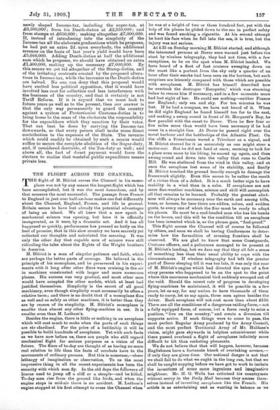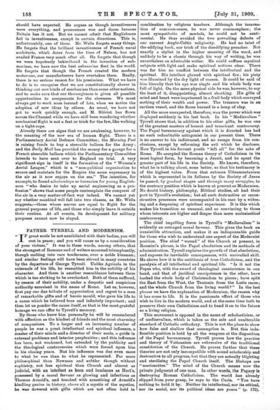THE FLIGHT ACROSS THE CHANNEL.
THE flight of M. Bleriot across the Channel in his mono- plane was not by any means the longest flight which has been accomplished, but it was the most hazardous, and by that measure the most successful. The passage from France to England in just over half-an-hour makes one feel differently about the Channel, England, France, and life in general. Britain seems to have lost already the potential advantages of being an island. We all knew that a new epoch in mechanical science was opening, but here it is officially inaugurated, as it were, by a dramatic act. And it has all happened so quickly, performance has pressed so hotly on the heel of promise, that in this slow country we have scarcely yet collected our thoughts and calculated the meaning. It was only the other day that capable men of science were still ridiculing the tales about the flights of the Wright brothers in America.
M. Bleriot is a man of singular patience and faith, which are perhaps the better parts of courage. He believed in the principle of his monoplane, and he persevered in his experi- ments with it long after other fliers were cruising in the air in machines constructed with larger and more numerous planes. His success was very gradual, and most other men would have accepted the other models, which at least had justified themselves. Simplicity is the secret of all good machinery, even though simplicity must necessarily be often a relative term ; and there is no doubt that if a monoplane flies as well and as safely as other machines, it is better than they are by reason of its simplicity. M. Bleriot's monoplane is smaller than almost any other flying-machine in use. It is smaller even than M. Latham's.
Besides the engine, there is little or nothing in an aeroplane which will cost much to make when the parts of such things are sta•idardised. For the price of a battleship it will be possible to build hundreds of aeroplanes. Yet with such facts as we have now before us, there are people who still regard mechanical flight for serious purposes as a vision of the future. The fliers of to-day are thought of as having no more real relation to life than the feats of acrobats have to the movements of ordinary persons. But this is nonsense,—sheer lethargy of imagination or observation. To us the most impressive thing in all the recent experiments has been the security with which men fly. In the old days the followers of Icarus used to jump off a cliff or a steeple—and be killed. To-day men rise from the ground like birds, and when the engine stops in mid-air there is no accident. M. Latham's engine stopped at his first attempt to cross the Channel when he was at a height of two or three hundred feet, yet with the help of his planes he glided down to the sea in perfect safety and was found smoking a cigarette. At his second attempt he hurt his face when he fell into the sea, it is true, but the injury was not serious.
At 4.35 on Sunday morning M. Bleriot started, and although the interested persons at Dover were warned just before the start by wireless telegraphy, they had not time, with a few exceptions, to be on the spot when M. Bleriot landed. We have heard of a fleet of fast cruisers sweeping down on the coast like a portent from the sky only a quarter of an hour after their smoke had been seen on the horizon, but such surprises are leisurely compared with those which are possible with aeroplanes. M. Bleriot has himself described how he overtook the destroyer 'Escopette,' which was steaming below to rescue him if necessary, and in a few moments more had lost sight of her. He could see nothing—neither France nor England ; only sea and sky. For ten minutes he was lost. If he had a compass, we have not heard of it. When he did sight England be found himself too far to the east, and making a sweep round in front of St. Margaret's Bay, he flew parallel with the coast to Dover. Thus he flew four or five miles more than would have been necessary if he had come in a straight line. At Dover he passed right over the naval harbour and the battleships of the Atlantic Fleet. On the cliffs a Frenchman waved a Tricolour as a signal, and M. Bleriot steered for it as accurately as one might steer a motor-car. But he did not land at once; seeming to look for a place even more to his liking, be soared up again, and then swung round and down into the valley that runs to Castle Hill. He was sheltered from the wind in this valley, and at once the aeroplane lost some of its stability, and finally M. Bleriot touched the ground heavily enough to damage the framework slightly. Even this seems to be rather the result of a virtue than of a defect. It is a much better sign to have stability in a wind than in a calm. If aeroplanes are not mere fine-weather machines, science and skill will accomplish all that remains to be learned. Probably • the greatest alert- ness will always be necessary near the earth and among bills, trees, or houses, for here there are eddies, calms, and sudden gusts, to every one of which the flier must be ready to adapt his planes. He must be a cool-headed man who has his hands on the levers, and this will be the condition till an aeroplane has been invented which is, as the phrase goes, "fool-proof." •
This flight across the Channel will of course be followed by others, and soon we shall be having Conferences to deter- mine bow the formalities of crossing frontiers shall be observed. We are glad to know that some Coastguards, Customs officers, and a policeman managed to be present at M. Bleriot's landing, but we dare say that they all felt a sense of something less than their usual ability to cope with the circumstances. If wireless telegraphy had left the greater part of Dover sleeping till it was too late, it was only the roar of M. Bleriot's engine which had directed the eyes of a few stray persons who happened to be on the spot to the point where this enormous mechanical bird suddenly swooped out of the void. Should the recent rate of progress in developing flying-machines be maintained, it will be possible in a few years, let us say, for any nation to have thousands of them ready to carry, let us say again, three men apiece besides the driver. Each aeroplane will not cost more than about £150. There are all the conditions of a dangerous raiding force,— not a fully equipped force, of course, but a force ready to seize a position, "live on the country," and create a diversion till supports arrive. If such things were to come to pass, the most perfect Regular Army produced by the Army Council, and the most perfect Territorial Army of Mr. Haldane's vision, might gaze skywards in helpless astonishment while there passed overhead a flight of aeroplanes infinitely more difficult to hit than rocketing pheasants.
We do not believe that that will happen, however, because Englishmen have a fortunate knack of overtaking arrears,— if only they are given time. Our national danger is not that we shall fail to do what we ought in the long run, but that we shall be caught napping before we have got to work to imitate the inventions of some more ingenious and imaginative neighbour. Mr. H. G. Wells has criticised his countrymen without mercy in the Daily Mail because they amuse them- selves instead of inventing aeroplanes like the French. His article is as entertaining and as wanting in balance as we should have expected. He argues as though inventiveness were everything, and pronounces woe and doom because Britain has it not. But we cannot admit that Englishmen fail in inventiveness, except in certain directions. This is, unfortunately, one of them. Mr. Wells forgets many things. He forgets that the brilliant inventiveness of French naval architects, which dates from the time of Nelson, has not availed France very much after all. He forgets that though we were hopelessly behindhand in the invention of sub- marines, we have now the best submarine fleet in the world. He forgets that though the French created the modern motor-car, our manufacturers have overtaken them. Really, there is no serious reason for his pessimism. What we have to do is to recognise that we are constitutionally slower in thinking out new kinds of mechanism than some other nations, and to make sure that our thoroughness is given all possible opportunities to compensate for the slowness. We must always get to work soon instead of late, when we notice the adoption of new ideas by others. As usual, we have not got to work quickly enough, and M. Bleriot has flown across the Channel while we have still been wondering whether mechanical flight is not a feat or trick for the few, like walking on a tight-rope.
Already there are signs that we are awakening, however, to the meaning of the new era of human flight. There is a Parliamentary Aerial Defence Committee; the Morning Post is raising funds to buy a steerable balloon for the Army ; and the Daily Mail has provided the money for a garage for a French steerable balloon which the Parliamentary Committee intends to have sent over to England on trial. A very significant sign in itself is the formation of the " Women's Aerial League," which is a "non-political organisation to secure and maintain for the Empire the same supremacy in the air as it now enjoys on the sea." The intention, for example, to found scholarships or bursaries for young English- men "who desire to take up aerial engineering as a pro- fession" shows that some people contemplate the conquest of the air in a very matter-of-fact way indeed. We cannot yet say whether mankind will fall into two classes, as Mr. Wells suggests,—those whose nerves are equal to flight for the general purposes of life, and those who simply leave it outside their routine. At all events, its development for military purposes cannot now be stayed.







































 Previous page
Previous page